You are viewing ARCHIVED content published online before January 20, 2025. Please note that this content is NOT UPDATED, and links may not work. Additionally, any previously issued diversity, equity, inclusion or gender-related guidance on this webpage should be considered rescinded. For current information, visit https://www.blm.gov/blog.
Podcast: Hot Jobs, North Star Crew is Hiring
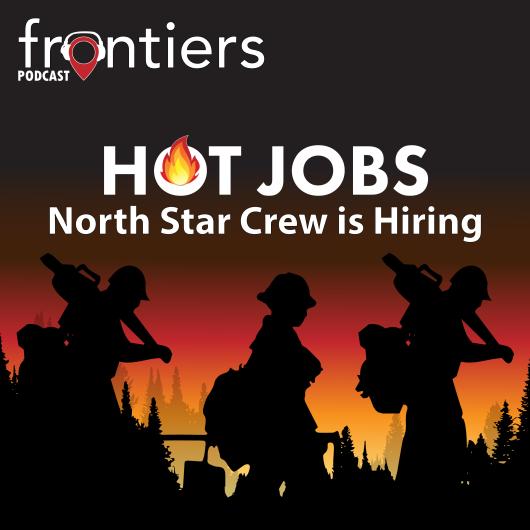
Transcript
Jim Hart: Welcome to the BLM Alaska Frontiers podcast, I'm Jim Hart. The 2022 fire season is approaching, and the Alaska Fire Service is hiring. It's the kind of job that will test your endurance and leave you with lifelong friends and memories forged in camaraderie and purpose. The job isn't for the faint of heart, but we're going to sit down with Ben Ferguson, superintendent of the North Star Fire Crew, to find out who would most enjoy this adventurous lifestyle.
Ben, thanks for coming on.
Ben Ferguson: Thanks for having me, Jim.
Jim Hart: So you've worked fires for some time now. What's it like?
Ben Ferguson: It's an immersive experience for sure. It's a lot of different experiences that people have … I would say that one common experience is that day to day, the work shift kind of drags on, and then the summer goes by in an instant. There's definitely the adventure side of the job. You often you see a lot of fire activity. It's a lot of adrenaline.
You see how quickly complexity escalates on a fire where there's an uptick in activity. Another enjoyable part of the job is how much of Alaska you get to see. I've been out on the Porcupine River, done fire assignments in the Brooks Range. I've been out at Lake Illiamna and out near Russian Mission where it's all tundra. So you get to see all these wilderness ecological systems in Alaska that you probably wouldn't otherwise have an opportunity to see.
[There’s] definitely a work side of the job. There’re pretty long shifts. It can be hard work. You get wet feet every day. There's lots of mosquitoes, but the job teaches do some things about life, too. You learn how simply you can live. You know, you're out there without a lot of your modern amenities and creature comforts, and sometimes you experience even more satisfaction There's kind of a strange simplicity and life in the wilderness and just working day to day with the crew.
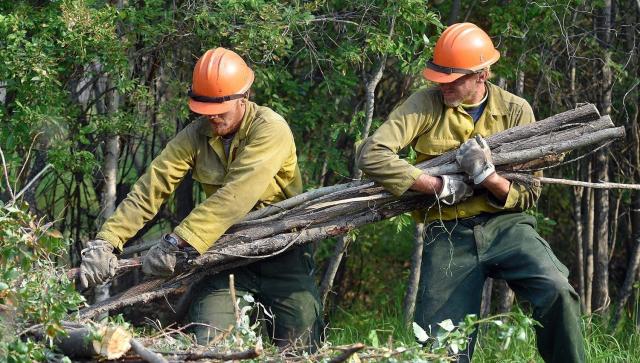
You also realize how much discomfort you can actually take when you're out there working long shifts in the rain, or you're not taking showers for two weeks, and you realize that you can get by without some of those modern comforts. And then you also realize, since you're with this group of 20 people working 16-hour days and camping with them and eating with them, you become very close with them over time.
And they become your extended family and a lot of relationships that are formed on the North Star crew last people kind of a lifetime. So yeah, it's a very different side of reality out there when you're isolated on fire assignments.
Jim Hart: How did you get into it?
Ben Ferguson: Well, my dad was a wildland firefighter at a Delta Junction. He did fire for 44 years. And I grew up with him in Delta doing a lot of hunting and trapping and love being outside. And then when I was fresh out of high school at 18 years old, I had the opportunity to join the Tazlina Hotshots based out of Glennallen.
And so that was kind of what got my foot in the door, was working with them. And then I joined Denali Hotshots a little later and then eventually went on to Tanana Chiefs, and then from 2014 to 2018 I worked on the Midnight Sun Hotshots. And it was in working on that crew that I got the opportunity in 2018 to run the North Star Crew.
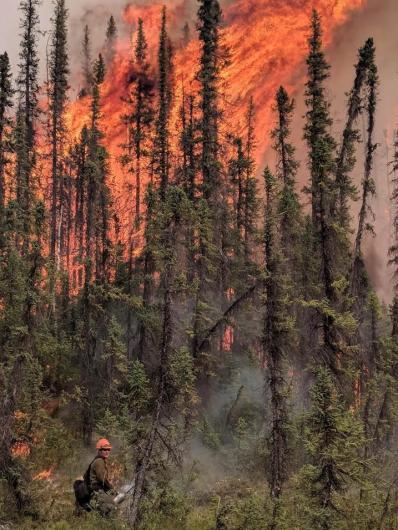
Jim Hart: What does a typical firefighter look like? What are their backgrounds? Lifestyles?
Ben Ferguson: It's interesting. There's a variety of people who apply to the crew for a lot of different reasons, some common themes. We have a number of applicants that are backcountry adventurers. A number of people are through-hikers, like along the Appalachian Trail or the Pacific Crest Trail. There's another segment of applicants that've been involved in team sports, have played rugby, football or hockey.
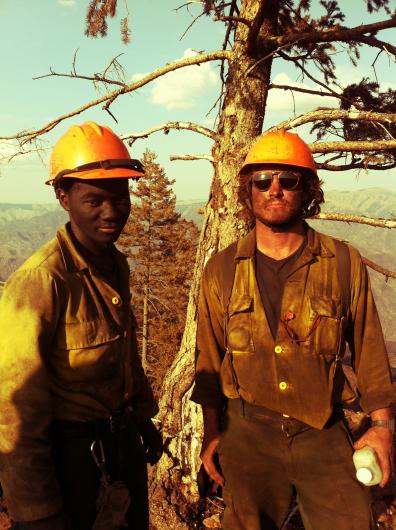
And so, they're kind of looking for a continuation of that team experience. And then we also have Alaska Natives that apply to the crew. And in those cases, you know, a major economic engine to rural Alaska in the past has been fighting fire. So, in those cases, the applicants apply, their parents have fought fire, they've been on the village EFF crew.
And so they're urging their kids to fight fire and find work that way. Got a few vets on the crew, and some folks are just high school applicants that are local as well. The last year was interesting. We had a particularly eclectic group of applicants. We had one applicant that was practitioner of medieval jousting -- the show Knights of Mayhem. And we had another who was from New Zealand, who had been the defense forces was this underwater saturation diver.
And he had set a Guinness Book a world record for rowing from California to Hawaii. And then another applicant last year was from Pennsylvania's Amish. So, there's a lot of different folks that apply to the crew. Some of them are academics. We had one that was a Ph.D. student who just kind of burned out of academia, applied that way.
But when we asked people why they applied to the crew, a lot of them said they're looking for summer adventure. A lot of people say that they're looking for something bigger than themselves. So they're trying to recover some sense of camaraderie or teamwork.
Jim Hart: I understand it could be a great seasonal work for students, but in some cases, fire seasons go on for the rest of the year. Are there other employment opportunities for this?
Ben Ferguson: So the North Star program starts in mid-May and goes until mid-August, so it's a 90-day program, which is really good for college students or anybody else who is just looking to see whether they like fire and kind of get an initial introduction. So, during those three months, we kind of set the foundation for fire. We teach a lot of the fundamental skills of wildland fire, but then at the end of that period of time, if they want to continue fighting fire, we'll make contact with different hotshot crews and try to kind of coordinate their transition to another crew.
Jim Hart: So how many of them end up staying on?
Ben Ferguson: I would say at least a third of the crew members probably do. And there are opportunities during the North Star season as well for our crew members to go on to Chena and Midnight Sun Hotshots. And then another certain percentage will apply the year following and try to get on Hotshot crew.
Jim Hart: What's your favorite memory from the North Star crew?
Ben Ferguson: Probably last year. We were on the Zitziana Fire, and our task was to cut around allotments, a large piece of private property. And there's a swamp that separated two sides of this allotment. So, we were prepping it for doing a burnout operation. And there's a large section in the middle, probably 400-500 feet wide, that was all marsh and swamp.
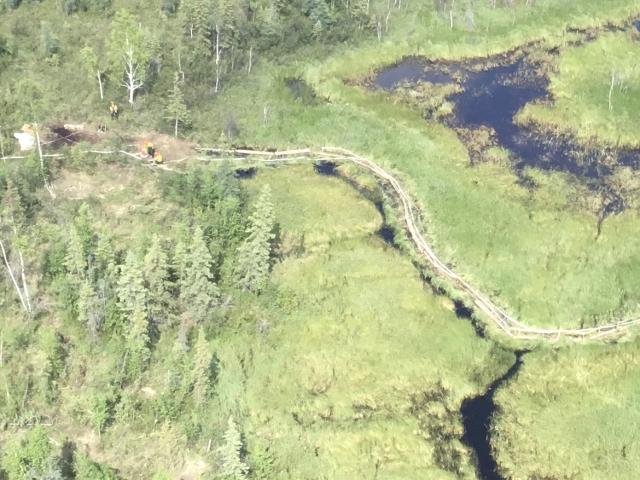
Ben Ferguson: So, we had to figure out a way to get from one side to the other. And what we wound up doing was building a bridge. It's probably the largest bridge that I've ever seen built by firefighters. It's about 400 feet across the swamp. And so, the crew members worked on it for several days, lashing sticks together and putting down what we called swamp pads to keep the bridge floating.
And it was really neat. There was some beaver canals alongside the bridge, and they would use the beaver canals to haul the logs out, as they kind of float through the canal. And they would bring the log to where it needed to go for the bridge construction. And the crew members got pretty excited about it. And it was really neat to see the progress of that.
And then at the end of the day, two and a half days of pretty hard work constructing this 40-foot long bridge, they're able to walk across and just in a matter of minutes and get to the other side of the allotment where they could continue working, cutting out the fuel break.
Jim Hart: There are quite a few people in BLM who got their start in fire. Do you know anyone like that?
Ben Ferguson: I do, yeah. That was doing the math recently to find out just how many people had passed through the program. So, our program has begun in 1987 and there's been about 20 people a year since then. So about 700 people have passed through the North Star program at one time or another. You see the slow-motion wave over the years of people that have begun on the North Star program and worked their way up through the ranks of the Alaska Fire Service.
Some of those folks include the current manager of the Alaska Fire Service, Kent Slaughter, fire management officer Jake Dollard is my boss, started on the crew and later on was the crew boss of North Star. Other others include Dustin Whitmer, who is the current assistant fire management officer of the Gelena Zone. And then Mike Butteri, who is the former Tanana Zone fire management officer.
Jim Hart: Where should people go to get more information?
Ben Ferguson: Well, the easiest way to get more information about the North Star crew is just to Google BLM Alaska Fire Service, North Star Crew. And on the BLM website is a North Star webpage where you can find the application and information about the crew. You can always call the North Star office phone number as well. And I'm happy to talk with applicants about what to expect from the program and describe things in more detail. That phone number is (907) 356-5665.
Jim Hart: Well, Ben, thanks for coming in and sharing with us about the North Star Fire crew.
Ben Ferguson: All right. Thanks for having me.
Jim Hart: That's it for this Frontiers podcast. Be sure to go to the Alaska Fire Service website to find out more about the jobs available. We'll put the link in the transcript. The Frontiers Podcast is a production of the BLM, Alaska Office of Communications.
James Hart, Public Affairs Specialist
Related Stories
Office
222 W 7th Avenue #13
Anchorage, AK 99513
United States
